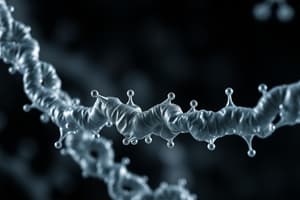Podcast
Questions and Answers
What is the main function of enzymes in living organisms?
What is the main function of enzymes in living organisms?
- Producing energy
- Transporting genetic information
- Forming cell membranes
- Maintaining homeostasis (correct)
Which biomolecule includes fats, oils, and phospholipids?
Which biomolecule includes fats, oils, and phospholipids?
- Nucleic Acids
- Carbohydrates
- Lipids (correct)
- Proteins
How do lipids contribute to cell structure?
How do lipids contribute to cell structure?
- By forming a hydrophobic bilayer (correct)
- By facilitating energy production
- By acting as enzymes
- By forming a hydrophilic bilayer
What is the function of proteins?
What is the function of proteins?
What dictates the unique three-dimensional structures and functions of proteins?
What dictates the unique three-dimensional structures and functions of proteins?
Which biomolecule possesses a unique three-dimensional shape that allows it to catalyze reactions?
Which biomolecule possesses a unique three-dimensional shape that allows it to catalyze reactions?
In the context of biomolecules, what is the role of nucleic acids?
In the context of biomolecules, what is the role of nucleic acids?
What is the main function of carbohydrates in organisms?
What is the main function of carbohydrates in organisms?
Which biomolecule stores an organism's genetic code?
Which biomolecule stores an organism's genetic code?
Why are biomolecules crucial for scientific knowledge about life processes?
Why are biomolecules crucial for scientific knowledge about life processes?
Which biomolecule forms a bilayer in cell membranes?
Which biomolecule forms a bilayer in cell membranes?
What supports the ongoing expansion of the study of biomolecules?
What supports the ongoing expansion of the study of biomolecules?
Flashcards are hidden until you start studying
Study Notes
Exploring Biomolecules: Proteins, Lipids, Carbohydrates, Nucleic Acids, and Enzymes
Biomolecules are the building blocks of life, composed of organic compounds that fulfill diverse roles within living organisms. Four major categories of biomolecules include proteins, lipids, carbohydrates, and nucleic acids, which we'll now delve into.
Proteins
Proteins are organic polymers composed of 20 different amino acids, whose sequence dictates their unique three-dimensional structures and functions. Proteins serve as structural elements, transporters, enzymes, and hormones, and they influence gene expression.
Lipids
Lipids are hydrophobic molecules that include fats, oils, and phospholipids. They are a vital source of stored energy and serve as structural components in cell membranes and organelles. Lipids, such as phospholipids, form a bilayer that separates cells from the external environment and compartmentalizes cellular components.
Carbohydrates
Carbohydrates are organic molecules containing carbon, hydrogen, and oxygen atoms. They serve as a primary energy source and structural component for organisms. Carbohydrates include monosaccharides, disaccharides, oligosaccharides, and polysaccharides.
Nucleic Acids
Nucleic acids, specifically DNA and RNA, store an organism's genetic code and play a crucial role in protein synthesis. DNA sequences determine amino acid sequences within proteins, thus governing their structure and function.
Enzymes
Enzymes are proteins that act as biological catalysts, accelerating chemical reactions within living organisms. Enzymes are essential for metabolic processes, maintaining homeostasis, and facilitating energy production.
Biomolecules in Action
The structure of biomolecules, often determined by their chemical composition and arrangement, is closely linked to their function. For example, lipids form a hydrophobic bilayer in cell membranes, while enzymes possess a unique three-dimensional shape that enables them to bind specifically to target molecules and catalyze reactions.
Understanding biomolecules is crucial for developing scientific knowledge about life processes, including cellular metabolism, genetic information transfer, and the evolution of life. Additionally, biomolecules play a significant role in medical research and biotechnology applications.
The study of biomolecules continues to expand, fueled by new discoveries and technological advances, such as freeze-dried cell parts for hassle-free molecule manufacturing and the conceptualization of essential biomolecules' roles in food webs. This research serves as a reminder of the fascinating interplay between biomolecules and the complex ecosystems they support.
Studying That Suits You
Use AI to generate personalized quizzes and flashcards to suit your learning preferences.




